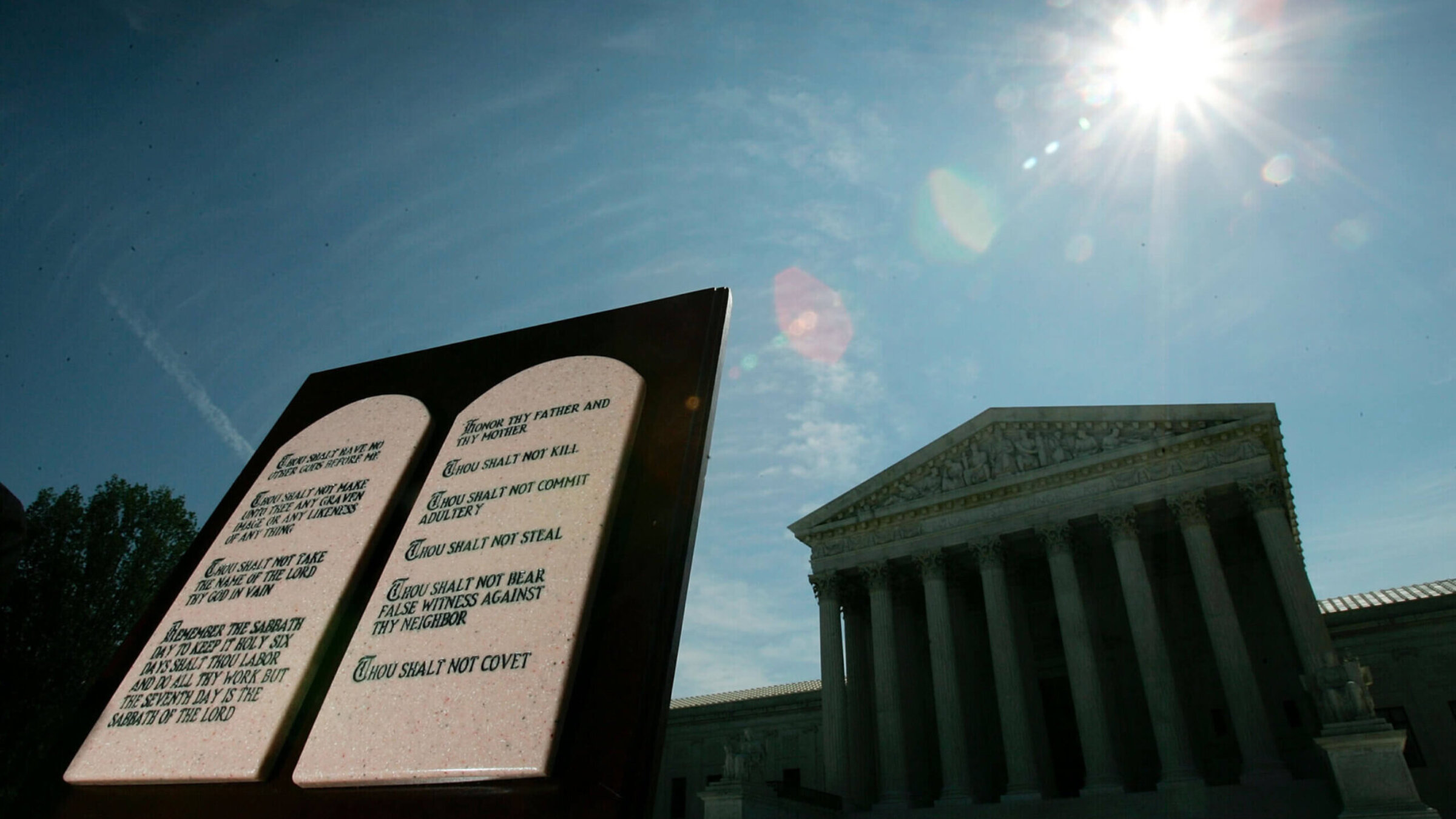Texas wants the Ten Commandments in each public school classroom. This is a blatant assault on religious liberty
A bill requiring the display of the Ten Commandments is under consideration in the state House

A copy of the Ten Commandments is displayed outside the U.S. Supreme Court June 23, 2005 in Washington, DC. Photo by Win McNamee/Getty Images
The Ten Commandments, as Moses received them, look very different from the commandments Texas legislators want to display in every public school classroom in the state.
The bill, passed by the state Senate and under consideration in the House this week, would require all public schools to “display in a conspicuous place in each classroom” a framed version of the approved Ten Commandments “in a size and typeface that is legible to a person with average vision from anywhere in the classroom.” The proposed translation comes not from religious scholars, but from a Minnesota Fraternal Order of Eagles committee, which created it in the mid-1950s to go on the group’s posters and monuments.
This proposed bill comes at a time when the Supreme Court has shown a willingness to reconsider limits on religious expression by publicly-funded agencies.
As biblical studies professors — one of us a Jewish Hebrew Bible scholar and the other a Christian New Testament scholar who lives in Texas — we are concerned about this bill. It threatens the very religious freedom the Supreme Court is supposed to protect.
Whose religious freedom?
The postwar revival of religion in the 1950s was a heyday for the Ten Commandments. Proposals to put them in schools appeared in various cities. First Amendment lawyer Leo Pfeffer, of the American Jewish Congress, helped identify the flaws in such policies: They are “bad theology, bad pedagogy and bad law,” not to mention unconstitutional.
While requiring the display of the Ten Commandments in public schools alone expresses an unconstitutional preference of faith, favoring a particular version of the Ten Commandments over others also puts the government in the position of determining which version of a religious text is best.
Any such campaign requires interpretive decisions that reflect theological judgments. After all, the two biblical versions, found in Exodus 20:1-17 and Deuteronomy 5:6-21 differ between themselves. And different religious traditions enumerate and translate the commandments differently. The Texas bill, for example, includes the commandment, “Thou shalt not kill.” This translation is absurd, given that the Bible in places mandates capital punishment and allows killing in war. Most modern biblical translations render it more accurately: “You shall not murder.”
These differences of translation cannot be easily resolved. And as Pfeffer notes in a 1957 memo, “It is not within the province of a democratic state” to “arbitrate or mediate among different views” of the meaning of biblical texts.
Beyond this, the law will alienate students of many faiths. Those in non-Abrahamic traditions will recognize that the “LORD thy God” affirmed by the commandments is not who they worship. Those whose religious practices include statues will find themselves daily reminded by a government-mandated poster to reject “graven images.” Children identifying with no religion at all will get a message from the state to adopt one.
This affront to the religious freedom of some is an affront to us all.
If it passes, the bill will almost certainly be challenged. But the rules of the game concerning church-state relations have changed. This legislation’s implications potentially extend far beyond Texas.
Until last summer, the Supreme Court used a three-pronged standard known as the Lemon test to determine whether government policies regarding religion crossed the line. Such policies had to have a secular purpose, had to steer clear of promoting or inhibiting religion, and had to avoid creating excessive entanglement between government and religion.
In its 1980 Stone v. Graham decision, the Court applied this test to declare unconstitutional a 1978 Kentucky law putting the Ten Commandments in schools. But last June, in Kennedy v. Bremerton School District, the Court discarded the Lemon test. Legal scholar Noah Feldman warns that how it will rule on future church-state cases is uncertain. It could well uphold mandates like this one.
Allowing religious features such as the Ten Commandments into the classroom typically favors Christian expression of religion, and we would all do well to heed the words of Jonathan Sarna, a leading historian of American Jewry: “I continue to feel that some of those who pay lip service to ‘religion in American life’ really have in mind one religion — and not mine.”
The words from the conclusion of Pfeffer’s brief ring as true now as they were 66 years ago: “The public school authorities are embarking upon a dangerous venture when they post the Ten Commandments in school classrooms” — and we must do our best to make sure that this does not happen.
To contact the authors, email [email protected].




















